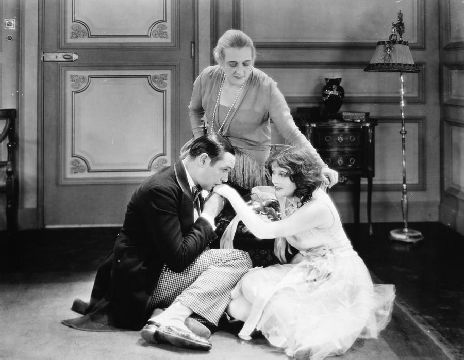The Garden of Eden (1928) 
“If you think you’re blasé—if you believe nothing on earth can make you perk up and stare—this is the film to see! It’s a fascinating folderol of fun!”

Director: Lewis Milestone
Cast: Corinne Griffith, Louise Dresser, Lowell Sherman
Synopsis: Toni Le Brun, a beautiful Viennese singer, becomes the ward of the wardrobe mistress of a Monte Carlo nightclub. Her benefactor, however, is actually a baroness incognito…
There’s something of Gloria Swanson about Corinne Griffith, the leading lady of The Garden of Eden, a frothy confection which bears hints of The Lubitsch Touch thanks to the fact that it was written by regular Lubitsch collaborator Hans Kraly. She’s certainly a beauty, although she had a tendency to play to the camera — just watch how many times she registers surprise with the careful formation of her lips into a perfectly round ‘O’ — and she also had a shrewd business sense which saw her amass a $150 million fortune through real estate when her acting career faltered in the early 1930s. She also turned a little bit eccentric, claiming for the last twenty-five years of her life to be her own younger sister.
The Garden of the title is attached to the Hotel Eden, a swanky haunt of the rich in Monte Carlo, but the story begins in more modest surroundings in Vienna. Toni LeBrun is the daughter of a baker but, as she explains in the note she leaves them when stealing away in the middle of the night, she won’t be satisfied making pretzels for the rest of her life. It turns out that Toni has been studying to be an opera singer (by correspondence course — Lord only knows how that works) and has now earned her certificate so she’s off to Budapest to take up the offer of a job with the grand sounding Palais de Paris. However, she arrives in the city to discover that the Palais de Paris is nothing more than a glorified strip club in which the dancers are expected to see to all their male visitor’s need, whatever they might be. Toni should have had an inkling something wasn’t right when the lesbian club manager, Madame Bauer (Maude George), asked to see her legs (and what legs they are) rather than hear her singing voice.
On her first night, Toni flatly refuses to wear the skimpy outfit selected for her, but is tricked into wearing an apparently modest costume which turns see-through in a certain light. When Toni realises this halfway through her song she rushes off stage to be comforted by Rosa (Louise Dresser), the wardrobe mistress who has become her only friend. While Toni is being comforted, the louche Henri D’Avril (Lowell Sherman) is greeted by Madame George. To illustrate just what a commodity the girls of the Palais de Paris are, their names and attributes are laid out in a menu from which D’Avril is invited to make his selection. Naturally, he picks Toni, the new girl, and Madame George arranges a rendezvous in a room of the theatre. When Toni resists the salacious D’Avril’s advances she finds that she is locked in the room, but Rosa comes to her rescue. Unfortunately, this results in both of them losing their jobs.
Drawing room comedy-dramas from the silent era aren’t known for their semblance to reality, and it’s at this point that The Garden of Eden well and truly parts company from the real world. Rosa persuades Toni to accompany her on her planned two-week vacation in Monte Carlo, and while there she reveals that she’s actually an impoverished baroness who works at her menial job fifty weeks of the year so that she can treat herself to these two weeks of luxury. She signs Toni in as her daughter, and it’s not long before Toni attracts the attention of Richard (Charles Ray), a wealthy young man. Unfortunately, Richard’s uncle (Edward Martindel) also takes a shine to her. While there’s never much doubt which of the two men Toni will choose as her lover, will the truth about her real past come back to haunt her?
Well, what do you think? Of course it will! This is 1920s Hollywood! It’s how the story arrives at its predictable outcome that’s important, and The Garden of Eden does so with a dash of mild-mannered farce which gives rise to only the occasional ghost of a smile. And, ultimately, its resolution relies on one of those coincidences of monumental stupidity that leaves you questioning the credulousness of 1920s audiences to such artifice Perhaps what is most striking about the movie is the independent spirit of Toni LeBrun who, although exploited by the Palais de Paris and toyed with by fate, refuses to be a victim. Such self-reliance was unusual in a 1920s heroine, and is refreshing to see – even if she does end up like every other 1920s heroine by the final scene.
(Reviewed 26th October 2013)
httpv://www.youtube.com/watch?v=GvITjzAAXYc
